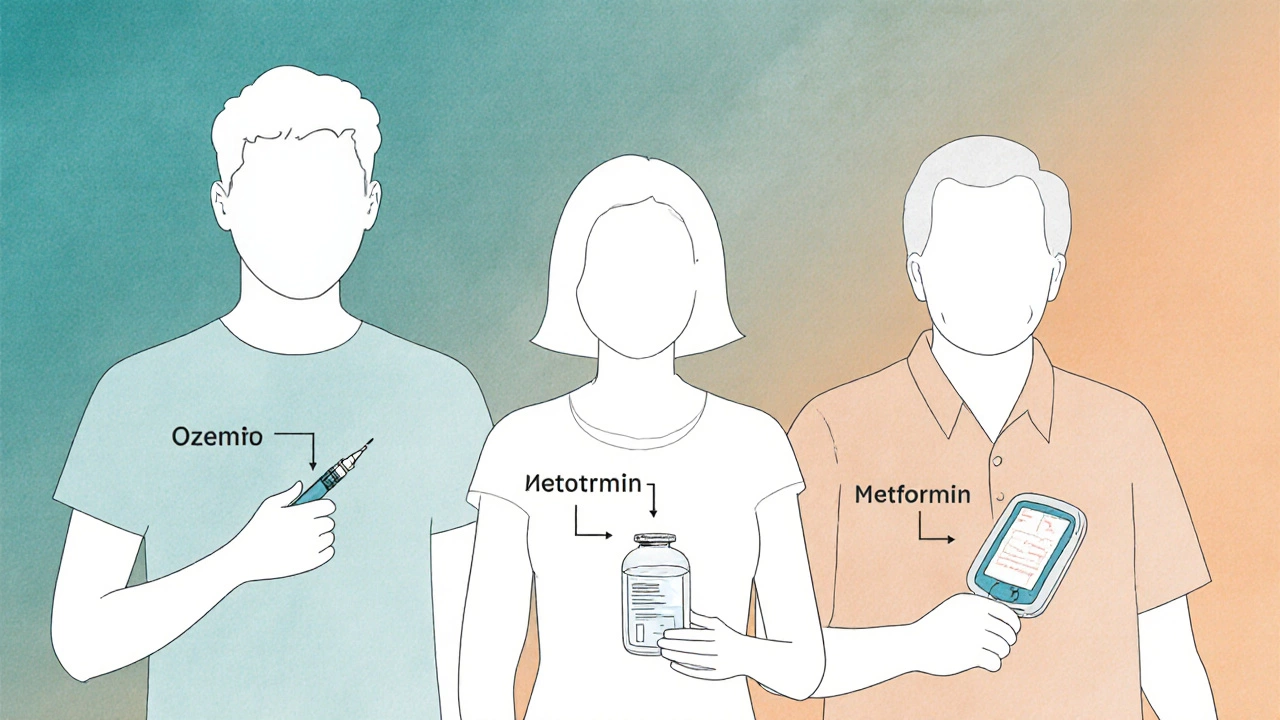Weight Loss Estimator: Ozempic vs Metformin
Estimated Weight Loss
Everyone wants a clear answer: if you’re on Ozempic, metformin, or both, how many pounds can you actually drop? The short answer is that results vary widely, but real‑world data and clinical trials give you a solid range to work with. Below, we break down the science, compare the two drugs, and outline what you need to do for the best chance at success.
Key Takeaways
- Ozempic (semaglutide) typically produces 10-15kg (22-33lb) of weight loss after 68weeks when used at the 2.4mg dose approved for obesity.
- Metformin’s average weight loss is modest - about 2-3kg (4-7lb) over a year - but benefits blood sugar control and may boost the effect of lifestyle changes.
- Combined therapy can add roughly 3-5kg (6-11lb) on top of Ozembic alone, mainly in people with higher baseline BMI.
- Success hinges on diet, exercise, and adherence; drugs are not magic bullets.
- Common side effects (nausea, GI upset) are usually short‑lived; serious events are rare.
Let’s dig into the details.
What Is Ozempic?
Ozempic is a glucagon‑like peptide‑1 (GLP‑1) receptor agonist whose active ingredient is semaglutide. It’s injected once a week and works by mimicking the gut hormone GLP‑1, which does three things: slows gastric emptying, reduces appetite, and boosts insulin secretion when blood glucose rises. The drug received FDA approval for type2 diabetes in 2017 and later earned a separate indication for chronic weight management at a higher 2.4mg dose.
What Is Metformin?
Metformin is a biguanide class oral medication that lowers hepatic glucose production and improves insulin sensitivity. It’s been the first‑line treatment for type2 diabetes for decades and is also prescribed off‑label for modest weight loss, especially in younger patients with insulin resistance.

How Do These Drugs Differ Mechanistically?
Both target the same disease-type2 diabetes-but they hit the body from opposite angles. GLP‑1 receptor agonist (Ozempic) acts mainly on the brain’s appetite centers and the stomach, while biguanide (metformin) works at the liver and muscle level to improve how cells handle glucose. The divergent pathways explain why Ozempic drives far larger calorie deficits, whereas metformin’s impact on weight is indirect, stemming from better glucose control and reduced fat storage.
Clinical Evidence for Weight Loss with Ozempic
In the STEP (Semaglutide Treatment Effect in People with obesity) trials, participants without diabetes received 2.4mg weekly for 68weeks. The average weight loss was 14.9kg (about 33lb), representing a 15% reduction in body weight. About 86% of participants lost at least 5% of their baseline weight, and 54% achieved a 15% loss.
For patients who have diabetes and are on the standard 1.0mg dose, the SURPASS‑2 trial reported a mean loss of 9.6kg (21lb) after 52weeks, still far above what most diabetes meds achieve.
Clinical Evidence for Weight Loss with Metformin
Meta‑analyses of randomized controlled trials consistently show a modest average loss of 2.1kg (4.6lb) after 12months of therapy, with greater effects (up to 4kg) in patients with a baseline BMI≥30kg/m². The effect plateaus after the first six months, indicating that any initial drop is likely due to improved insulin sensitivity rather than appetite suppression.
Combined Therapy: What Do the Numbers Say?
Real‑world studies from large health‑system databases have examined patients prescribed both drugs. In a 2023 cohort of 4,500 individuals with a mean baseline BMI of 36kg/m², the combination yielded an average loss of 12.3kg (27lb) after 12months-approximately 3kg more than Ozempic alone. The added benefit appears strongest in those whose HbA1c dropped below 7% within the first three months, suggesting better metabolic control amplifies the appetite‑reducing effect.

Practical Considerations: Dosage, Side Effects, and Safety
Ozempic starts at 0.25mg weekly, titrating up to 2.4mg over 16weeks. Most GI side effects (nausea, vomiting, constipation) occur during the titration phase and subside once the target dose is reached. Rare but serious risks include pancreatitis and gallbladder disease.
Metformin is usually started at 500mg once daily, increased to 1,000-2,000mg per day in divided doses. GI upset is common; taking the drug with meals or using the extended‑release formulation reduces discomfort. Lactic acidosis is a theoretical concern but is extremely rare when renal function is normal.
How Lifestyle Shapes Outcomes
Both drugs work best when paired with a calorie‑controlled diet and regular exercise. A 500‑calorie daily deficit-roughly a half‑plate of vegetables and a portion of lean protein-combined with 150minutes of moderate‑intensity activity per week can add another 2-4kg of loss over a year. Tracking tools such as continuous glucose monitors (CGM) or smart scales help keep momentum.
Bottom Line: Setting Realistic Expectations
If you’re on Ozempic alone, aim for 10-15kg (22-33lb) after a year if you stick to the 2.4mg dose and adopt modest lifestyle changes. Adding metformin may nudge that figure up by another 3-5kg, especially if your starting BMI is high and your blood sugar improves quickly. Expect the first few weeks to be rough on the stomach-plan light meals and stay hydrated.
| Regimen | Average Weight Loss (kg) | Study Duration | % ≥5% Loss | Common Side Effects |
|---|---|---|---|---|
| Ozempic 2.4mg weekly | 14.9 | 68weeks (STEP‑1) | 86% | Nausea, vomiting, constipation |
| Metformin 1,500mg daily | 2.1 | 12months (meta‑analysis) | 32% | Diarrhea, abdominal discomfort |
| Ozempic+Metformin | 12.3 | 12months (real‑world cohort) | 78% | Combined GI profile |
Frequently Asked Questions
Can I use Ozempic for weight loss if I don’t have diabetes?
Yes. In 2022 the FDA approved a 2.4mg dose of semaglutide (marketed as Wegovy) specifically for chronic weight management in adults with a BMI≥30kg/m² or ≥27kg/m² with at least one weight‑related condition.
Is it safe to take metformin and Ozempic together?
For most patients the combination is safe. The drugs work on different pathways and don’t interfere chemically. Monitor kidney function and watch for cumulative GI symptoms.
How quickly will I notice weight loss on Ozempic?
Most people see a 1-2kg drop within the first 8‑12weeks, mainly due to reduced appetite. The biggest reductions happen after reaching the maintenance dose.
Do I need to continue diet and exercise while on these meds?
Absolutely. Lifestyle changes amplify drug effects and safeguard against weight regain once medication is tapered or stopped.
What if I experience severe nausea?
Pause dose escalation, stay hydrated, and try low‑fat, bland foods. If nausea persists beyond two weeks, contact your clinician for possible dose adjustment or an anti‑emetic.
